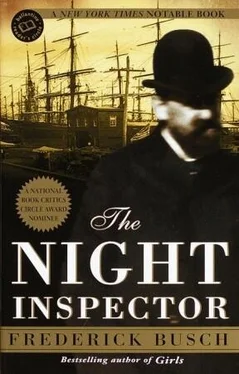“I do. And the remnants of Africa.”
“But that was in the lower end of the city,” he said. “Canal Street, Grand Street, am I right? Laurens? Thompson? It’s all but disappeared.”
“Because of the Loin.”
“I have seen a number of dark faces there.”
“White men pay to have black women,” I said.
“Better than the old way,” he said, “where they paid to own black women, who then gave birth to black women they might have.”
The corner of Sam’s notebook was in his hand.
“I am told that you are moderate on the Negro question.”
“Oh? Moderate? I am not for any more war, if that’s what you mean. Nor, though, am I — nor should I be! — moderate on the matter of the holding of slaves. It’s the holding of grudges I would warn against, either side, either army, either color. Now is the time to get the black man what we may without requiring the South to carry it to him on bare feet. I said in a tale of mine once that the shadow of the Negro is a long one.”
“Babo!” Sam said.
He reached to pat Sam’s arm in acknowledgment. Sam’s sallow face began to glow, though all the while his jaw muscles worked and his eyes, as if on mechanical swivels, moved from M to me and back.
“We are in for a difficult time,” he said.
Sam said, “You mean tonight?”
“And tomorrow, shipmate. Many tomorrows from now.” His focus disappeared, and his eyes seemed made of slate, absorbing light and giving little. He might, for all I knew, have been thinking of his son and then of his son, of his daughters, and his baffled, unhappy woman.
Sam had surrendered. His notebook was out, I had watched it move from his inside breast pocket to his hand and then to his lap, where, with a stub of pencil, he scribbled while saying, “Sorry. Very sorry — a moment, if I—”
M did not hear him. I, consulting my watch, declared against dessert and signaled for the bill.
As if waking of a sudden, M smiled his resigned, baffled smile. “So we’ll voyage into darkest New York. We’ll mingle with the darker brothers.” He nodded his head. “I see them daily at the docks, of course. Once,” he said, “I shipped with them. I slung a hammock beside theirs. I labored on the decks and in the rigging with them.”
Sam, I saw, was racing across his little pages to get it all down. But Adam was waiting outside, I was certain, so I replaced the veil with the mask and I chivvied and prodded until Sam had tucked his notebook away and had hovered, assisting M from his chair, as if he were not more lithe and graceful than Sam himself. Cheerie threw a little salute, and I returned it, then we made our way among the tables and through the frightened or fascinated stares and out to the street where Adam—“You ax”—was waiting as I thought he would be.
He wore a clean, wrinkled shirt with long sleeves and without a collar. It was buttoned at the neck as though the night were cool, whereas it had grown sultry during the day, and occasional thunder scraped across the low clouds that had sealed the city in during the late afternoon. I could not see the clouds, but caught occasional flares of lightning on the edge of my vision against the eyeholes of the mask.
I introduced Adam to the company, and I insisted upon clasping him by the hand. His was as hard and scuffed as lumber. His broad nose and grim mouth, his red-rimmed eyes, which put me in mind of M, and his bulky shoulders and thick thighs made him formidable as, particularly when we entered the Loin, a companion and an escort and something of a guard. He was dressed in cast-off trousers too short for his long legs, and a pair of cracked high shoes that looked uncomfortable as he walked, and yet he commanded respect, I thought; he looked as though he owned the stones on which he trod.
“You have the money I sent.”
He nodded. I regarded him, and he me, and finally he said, “Thank you.”
“You’ll earn it. You understand the errand?”
“Show these gentlemen the sights.”
“No, sir. This is not a gentlemen’s tour of darkest New York. I meant no humor. I want them to understand what it is to be poor and Negro and to struggle for a life in the city. I do not mean to entertain them.”
I heard him expel a breath and then I saw him smile. “I can do that.”
“And you will?”
“If that’s what you want.”
“No. You must want to as well — or at least be willing to.”
“I am, Mist Bartelmy.” M’s head turned as Adam said this last. “I said it: You ax. That’s what you did, and here I am. No money needed, tell you the truth.”
“Thank you, Adam. It should be a transaction, however. One man pays, the other man receives. Done, then?”
He nodded.
I said, “We ought to begin, gentlemen. Westward, then, and down a few streets. I am armed.”
Sam held up his notebook, as if it would defend us all.
M said, “I am beyond harming. I need no defense, thank you.”
Adam opened his mouth, then closed it, and we wheeled to cross the avenue. “Go ahead,” I told him. “Speak if you have words to tell us.”
“Sir,” he said, “isn’t anyone past being harmed. And in the Loin, be thinking of the lion’s den. People there, all kinds of colors, they would eat you up and swallow you down.”
Sam stood to open his notebook and then catch up.
“You correct me truly, shipmate. It was wishfulness you heard, and sorrow for the self. May we all take care.” Nevertheless, he trod on the toes of his boots and then lifted himself into the air to click his feet together and then, with equal grace, walk on.
“This gentleman’s a minstrel,” Adam said.
Sam made a sound of low pleasure, and he scribbled as he walked.
We entered the gaming house, set behind Seventh Avenue, through an alley off the street. It was narrow, and the bricks of the walls felt moist. Iron fire steps hung halfway down the wall to our left and then stopped: You would have to drop thirty feet, fleeing a fire, and then drive your broken anklebones up and into your shins. The light there was whatever fell from the dark sky or filtered through from the street. Adam opened a low door, perhaps five feet high, and we followed him in. Another door, of normal height, was opposite, in a gaslit vestibule. From outside came a sound as of grunting and then squealing and then a kind of high roar.
I heard M exclaim, and then I heard the squeal. Adam passed me as he returned to the alley, and soon enough he returned to say, “One of those pigs.”
“It was a giant hog,” M said. “Long and high and vicious.”
I had seen them from time to time. Sam, evidently, had not. “Is this a farming district?” he asked Adam.
“No, sir. They eat the refuse behind the houses. They clean the streets.”
“Then soil them, I take it,” Sam said.
“Nobody thought of that when it started. Now they can’t stop ’em, sir.”
“Shipmate, you have just heard the story of how nature won’t be tampered with or tamed. Great pigs roaming the streets like mako sharks in the sea.”
“Like … whales,” Sam ventured.
No one replied, and we entered the room. It was very long and brilliantly lighted and hot, from the massed bodies at the tables and the bar. Not all the girls were Negro, nor were all the customers white, but it was easy to see that a large measure of appeal was the color of the women’s skin; some, like Adam, were dark and they gleamed, while some were almost the color of Jessie — without the lemony glow that colored her, it seemed to me, from within — and others were tan, and even white with a bridge of freckles, often, that shaded the cheeks and the nose. Every one of them was escorted, or embraced, or fondled intimately by a man whose skin and manner were obviously white: They made it clear that they owned, or had recently hired, the darker women whose pleasure it must be to give them pleasure. A very fat and sweating black woman played the piano; at that moment, she gave an expert rendition, I thought, of “When You and I Were Young, Maggie.”
Читать дальше












